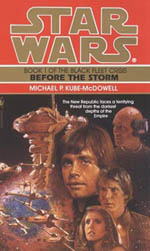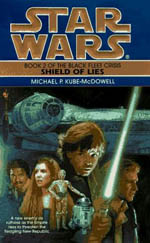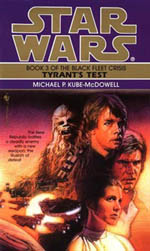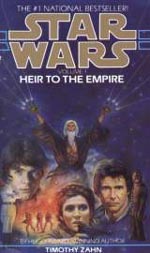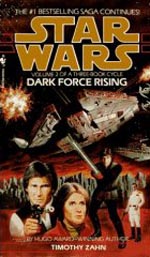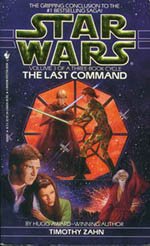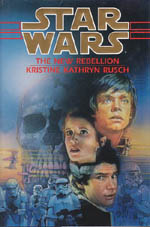 What I’d like to know is the identity of the editor at Bantam who sent out the memo to all the Star Wars novelists: “Princess Leia is to be portrayed as a complete retard from this point forward.”
What I’d like to know is the identity of the editor at Bantam who sent out the memo to all the Star Wars novelists: “Princess Leia is to be portrayed as a complete retard from this point forward.”
In the Black Fleet Crisis trilogy I was willing to accept it as merely a character arc which had gone wrong in the execution. But now I find the exact same misfire as I read The New Rebellion. Leia isn’t quite as stupid as she was at the beginning of the Black Fleet Crisis trilogy (thank god!), but she’s still wandering around with only half her braincells firing.
…
Okay, I needed to get that off my chest. Now, on to the good news: The New Rebellion is a lot of fun wrapped up in a clever little plot. The result is a quick, compelling dollop of entertainment.
We’ll come back to that in a second, but first I need to do some anal retentive bitching about continuity:
In reading The New Rebellion immediately after the Black Fleet Crisis, I’m struck by the fact that the books almost seem as if they take place in alternate timelines. Continuity simply doesn’t track from one to the other:
In the Black Fleet Crisis, Luke has long-since abandoned his X-Wing for the newest model of fighter and Artoo is with Leia on Coruscant. In The New Rebellion, supposedly set only a year after the Black Fleet Crisis, Luke is still flying his X-Wing and Artoo is with him at the Jedi Academy .
In the Black Fleet Crisis, Leia faces a vote of no confidence and numerous, fractious political debates. In The New Rebellion, Leia is concerned that a recent constitutional change allowing members of former Imperial governments to run for the Senate will lead to factious political debates previously unknown to the New Republic. Later, she’s shocked when she faces a vote of no confidence.
Nothing seems to track quite right. And I rather suspect it’s because Rusch originally intended for The New Rebellion to take place at a much earlier time in the post-ROTJ timeline. I could be wrong, but there just seem to be a lot things in this novel which feel as if it were originally meant to take place only 6 or 7 years after ROTJ, not a decade and a half. It also seems that a lot of the references to recent events (such as the Black Fleet Crisis) are tagged onto the novel in a somewhat haphazard way.
In any case, if you’re someone who’s going to get bent out of shape due to continuity lapses, you’re probably going to have some serious issues trying to get the Black Fleet Crisis and The New Rebellion to co-exist in your mental landscape of the Star Wars universe.
For my own mileage, though, I was able to consider such inconsistencies as little more than intellectual curiosities and enjoy The New Rebellion for what it was: A unique vision of Star Wars future history.
I think what I like best about The New Rebellion is the fact that the villain has more up his sleeves than a simplistic “get a really big fleet, sow discord among the leaders of the New Republic, and get the crap beaten out of me in a big space battle at the end of the story”. There’s nothing wrong with such a plot, per se, but between the Thrawn Trilogy and the Black Fleet Crisis it had already worn thin. (And I understand that in several of the tie-in novels I’ve skipped that it gets run through the wash a half-dozen times more.) By contrast, the villain in The New Rebellion is subtle, complex, and indirect.
Other highlights for me include Rusch’s handling of the Solo family: As the crisis grows and the personal threat to the Solos increases, you can really empathize with Han and Leia as the emotional and physical pressures being to weigh upon them.
Actually, with the exception of Leia’s stupidity in the earlier parts of the novel, Rusch is really spot-on in her handling of characters throughout. Evil plots from dastardly villains aside, the real strength of The New Rebellion, for me, were the character dramas which played out upon the stage set by the emerging crisis. I was impressed by Rusch’s ability to put an emotional truthfulness down on the page, revealing all of her characters (both new and old) as fully-rounded human beings. (Or aliens, as the case might be.)
GRADE: B-
Kristine Kathryn Rusch
Published: 1997
Publisher: Bantam Spectra
Cover Price: $6.99
ISBN: 0-55-357414-0
Buy Now!

